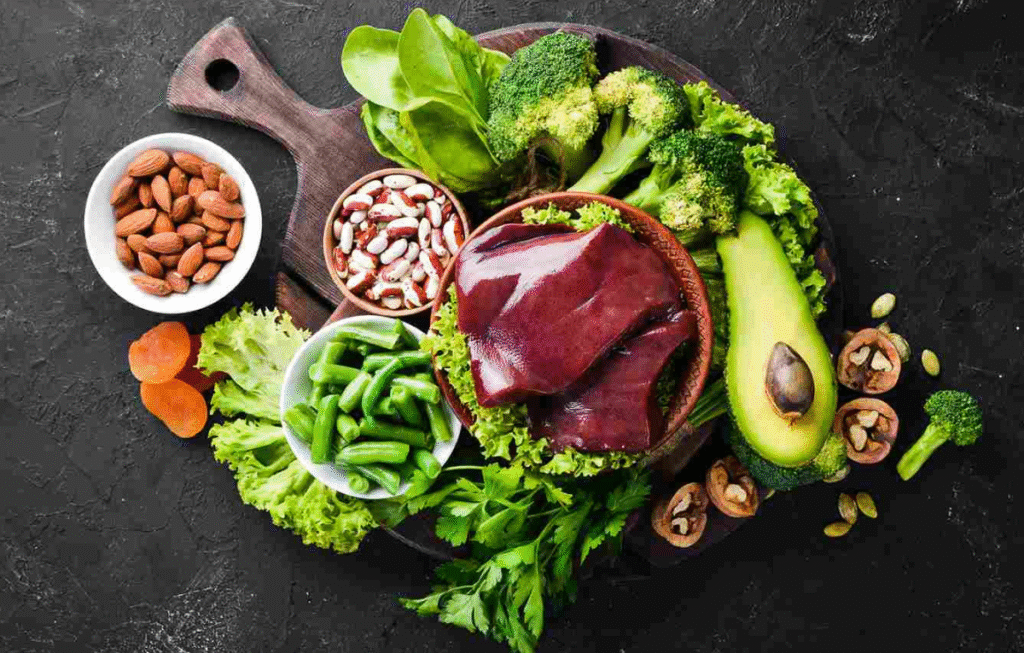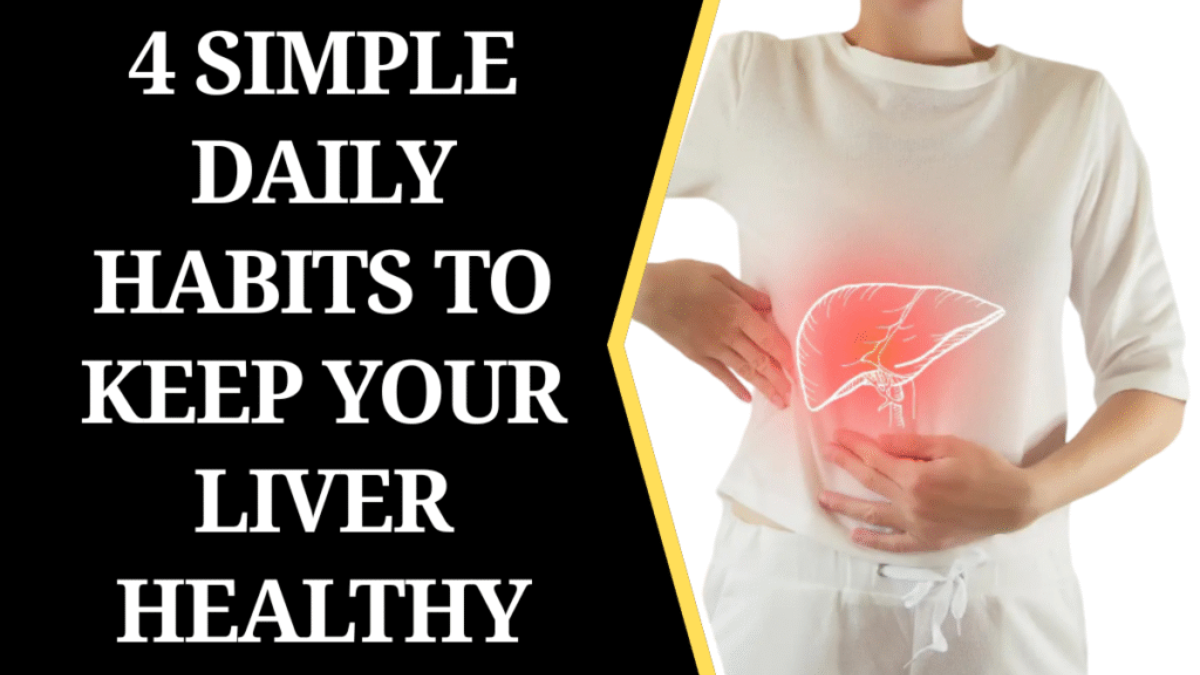All organs of our bodies are essential, but it would probably not be a disappointment if the liver were called the “superhero” of the body. Behind the scenes, it works round the clock, protecting us from toxins, fats, and diseases.
It carries out more than 500 essential functions of the body such as filtering blood, digesting food fats, making bile for digestion, storing vitamins and minerals, and balancing energy levels. Usually, for liver matters, we tend to neglect it unless something sets in, such as fatty liver, hepatitis, or cirrhosis.
With poor diet, junk foods, stress, lack of sleep, and hard drinking, these diseases tend to move at a very fast pace nowadays. Good part: no drastic changes are required in your lifestyle. From only four simple daily habits, you can keep your liver fit and healthy throughout your life. Let’s look at those habits in detail along with many other tips that will keep your liver in perfect shape.
1. Eat a Liver-Friendly Diet

Let us talk about eating, as it can directly affect the liver. If we gorge on fried and processed foods, extra sugar, white flour, or strong alcohol, it will just pose an extra load on the liver. That sooner or later leads to fat build-up, inflammation, and gradual liver destruction.
Fresh, healthy, and natural food, on the other hand, strengthens the liver and renders it capable of doing its job.
Include These Liver-Supporting Foods:
- Green leafy vegetables (spinach, mustard, coriander, fenugreek, kale): Chlorophyll is an important chemical that can remove toxins from the system.
- Cruciferous vegetables (broccoli, cauliflower, cabbage): Have sulfur compounds that induce hepatic detoxification enzymes.
- Garlic and onions: Allicin protects liver cells and improves blood circulation.
- Turmeric: Curcumin reduces inflammation and promotes bile secretion.
- Berries (blueberries, strawberries, cranberries, amla): These antioxidants protect the liver from damage caused by free radicals.
- Healthy fats (walnuts, almonds, flaxseed, olive oil, coconut oil): These fats help reduce inflammation and repair damaged cells.
- Whole grains and pulses: They consist of fiber that aids in digestion and reduces fatty liver risk.
Limit or Avoid:
- Refined carbohydrates and sugars (such as white bread, all-purpose flour, confectioneries, and soft drinks).
- Deep-frying foods and trans-fat-containing foods like burgers, pastries, samosas, and potato chips.
- Consume alcohol- greatest contributor of liver diseases.
- Processed, packaged, and canned foods loaded with chemicals and preservatives.
Tip: Make half your plate vegetables at every meal, eat some fruits, and keep well hydrated through the day.
2. Stay Physically Active

Another secret to healthy liver maintenance is keeping the body in motion. These days, most of us spend hours sitting either at work, at home, or at college. This is called a sedentary lifestyle, one of the major causes of fatty liver.
Exercise is basically the body’s mechanism to burn fats; it regulates insulin levels in the body and keeps fats from storing in the liver.
Best Types of Exercise for Liver Health:
- Brisk walking or jogging: Brisk walking for 30 minutes daily keeps liver fat at bay.
- Strength training (dumbbells, pushups, squats): Builds muscle and metabolism.
- Yoga and pranayama: Reducing stress, increasing blood flow, and improving digestion.
- Dance, cycling, or swimming: Fun activities to work out.
Tip: If you can’t manage the time, slight tweaks like taking the stairs instead of the elevator, walking instead of driving to a close distance, or stretching for five minutes every hour can work wonders.
3. Stay Hydrated and Reduce Toxin Load

The liver is a filter built into our bodies. It filters out alcohol, drugs, pollution, and food chemicals. But if the toxin load increases too much, the liver is overwhelmed.
Practical Tips:
- Drink water aplenty: at least 8-10 glasses daily.
- Herbal teas are good: green tea, lemon water, celery water, or light coconut water relax the liver.
- Avoid unnecessary medicament: Excess use of painkillers or antibiotics could affect the liver further.
- Use natural cleaning agents at home: lemon, vinegar, and baking soda instead of harsh chemical cleaners.
Minimize alcohol consumption: If you are forced to, then do so with moderation. Better maintain the health of your liver by being an abstainer.
4. Prioritize Quality Sleep and Stress Management

The Individual Health Newsletter writes about how people think that only food and alcohol affect the liver, whereas sleep and stress are equally important.
- During sleep, the liver detoxifies and repairs the body.
- When stress rises, hormones are thrown into disarray, and this puts added strain on the liver.
Better Sleep, Better Liver Health:
- Have 7 to 8 hours of deep sleep every night.
- Try to reduce screen time from mobile phones or TV an hour before bed.
- Stretch out some quiet time reading a book or in meditation.
- Avoid eating late, heavy dinners, or late bedtime.
Manage Stress Effectively:
- Yoga, meditation, and progressive relaxation respiration.
- Being outdoors-in a walk through the park or sitting in a garden.
- Doing something you enjoy-painting, singing, or gardening.
- Being with friends and family-this is a natural mood lifter.
Additional Tips for Long-Term Liver Care
The above tips may be easy to follow, but here are some more to remember:
- Maintain a healthy weight: A fatty belly is directly related to fatty liver.
- Have an annual examination: Liver function tests will pick up early problems.
- Cook with safe oils: Olive oil, coconut oil, or ghee are safer choices.
- Never skip meals: Eat balanced meals at intervals so as to maintain blood sugar and metabolism.
- Quit smoking: Smoking harms the liver too.
Conclusion
A liver is really the unseen warrior of the body. It purifies our blood, aids digestion, maintains energy balance, and protects us from disease. If we don’t take care of it, then it will slowly start draining itself into sickness.
Minor changes can make quite a big difference- such as having a healthy diet, performing regular exercise, drinking plenty of water, staying away from chemicals and alcohol, getting enough sleep, and leading a relatively stress-free life.
Remember, “keeping your liver fit is not a one-day job.” It is a lifestyle. The more consistent you are, the healthier your liver will become and the longer it will stay well. So, make a choice today give your liver the attention it deserves. Because a content liver will keep your entire body in good health, and you’ll enjoy an energetic, healthy life.
FAQs:-
Which foods are best for liver health?
Leafy greens, cruciferous vegetables, berries, garlic, and turmeric are excellent for cleansing and protecting the liver.
Why is liver health important?
The liver filters toxins, aids digestion, and supports metabolism. Keeping it healthy prevents fatty liver, hepatitis, and other diseases.
Can drinking water really improve liver health?
Yes! Staying hydrated helps flush out toxins and supports smooth liver function every day.
Medical Disclaimer
The information provided on Health Tips India is intended for educational and informational purposes only. It should not be considered a substitute for professional medical advice, diagnosis, or treatment.
Always consult a qualified healthcare professional before making any health-related decisions or changes to your diet, exercise, or medical routine.
SamhithaHealth & Wellness Content Writer
a Health & Wellness Content Writer with over 6 years of experience creating research-based health articles. She specializes in nutrition, weight management, diabetes care, skin health, and healthy lifestyle practices. Here content is carefully written using trusted medical and scientific sources to ensure accuracy and clarity for readers.

